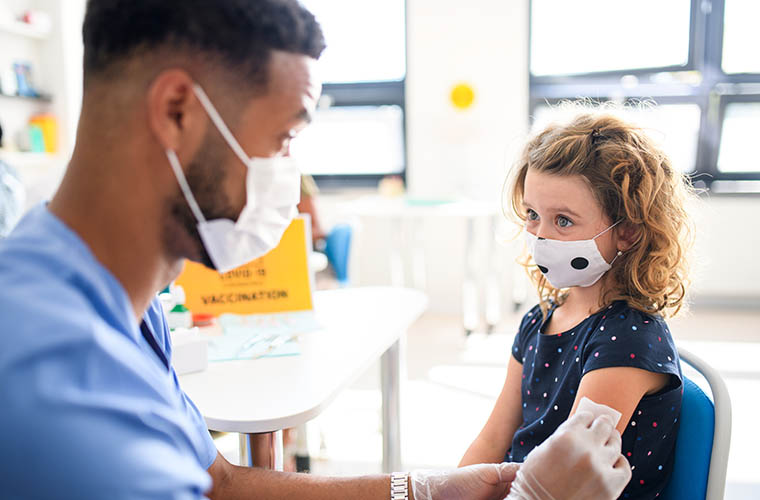The Effect of the Pfizer Vaccine for Children Under Five
Child with face mask getting vaccinated, coronavirus, covid-19 and vaccination concept.
February 17, 2022
Children under five years old in the United States are the only group not yet authorized for the COVID vaccine. In recent news, Pfizer requested the FDA to approve two doses of their Covid-19 vaccine for children under five years old. While under request, Pfizer continues to research the effect of three doses on children in this age group.
The result of the vaccine did not make the same amount of antibodies in children aged two to five compared to older children and adults. For children under two years old, it was reported that the assigned dose was safe and provided an effective immune response. Regarding the negative results from the two doses, the companies were advised to test the third dose but have decided to postpone the studies until March.
Even though there it is very possible for these children to get vaccinated, many parents are hesitant to face the possible side effects. Omicron has been the most transmissible strain of Covid-19 which has greatly impacted the number of children admitted into pediatric care. Since the dosage of the vaccine was not as effective for the specific age group, 2-5, Pfizer hopes that the third vaccine will be more productive in creating the desired immunity.
The FDA explains that even giving this age group one dose is more effective than providing nothing. They continue to focus on the age group as the next demographic for the vaccine. Sharon LaFraniere and Noah Weiland stated, “Children 2 to 4 years old who were given two shots were infected at a rate 57 percent lower than the children in the placebo group. Children 6 months to 2 years old who got shots were infected at a rate 50 percent lower than the placebo group.” This statement correlates to the idea that anything is something.
Children are less likely to become severely ill after contracting Covid-19. Many children test positive with the virus but experience no symptoms, on the other hand, a small majority of children need to be placed on ventilators in intensive care units. As shown, the effect of Covid-19 on children varies in severity, so providing the ability for these children to become vaccinated will be beneficial not only for them but for family members as well.
Myocarditis, a fatal inflammation of the heart muscle, is a possible side effect of receiving the vaccine (also possible after getting COVID). This is a significant worry for parents of these children getting the vaccine. Though, it was proven that the median age to get this condition after receiving the vaccine was 25. Health records from about two-million people concluded there is more of a risk of getting myocarditis from catching Covid-19 than receiving the vaccine.
Some experts, such as Dr. Jeremy Faust, suggest that pushing the vaccine so soon will leave many parents hesitant to provide it for their children. He states, “I’m worried that if we rush now, there will be fewer young children vaccinated by next fall than if we wait a few more weeks.” Parents are more likely to go through with getting the vaccine if it is pushed by schools and pediatricians. It has been shown that many parents have pushed off recent visits with their children’s doctors. As the majority of visits have come to be virtual, the effectiveness of care has descended.
To conclude, the recent push of vaccines will only continue to rise. At this stage, any dosage for children under five will be effective and continue to improve. Once the authorization of higher dosages occurs, the push from pediatricians, schools, and other trusted resources will hopefully encourage parents to allow the vaccine for their children. The ability for vaccination is on the rise and hopefully will be available at the end of March.



